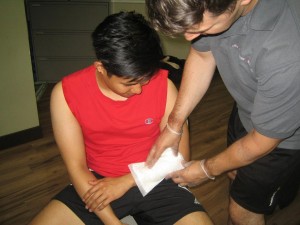It is important to note that dyshidrotic eczema is a condition in which small-sized blisters form on the hands and feet. These blisters are often itchy. This blistering eczema usually affects women more than men.
Those who are likely to develop this type of eczema are constantly under stress, have allergies such as hay fever, constant exposure to water and engage in cement work that exposes the hands to cobalt, chromium and nickel. The exact cause is still unknown and the condition often appears during certain times of the year. By enrolling in class on first aid, you can learn how to manage this condition.
What are the symptoms of blistering eczema?
The small, fluid-filled blisters known as vesicles usually develop on the hands, fingers and feet. These blisters are quite common along the perimeters of the toes, fingers, soles and palms as well as very itchy. They can also cause scaly patches of skin that eventually flake or become red, cracked and sore. If the individual scratches these blisters, it can cause changes on the skin such as thickening while the large blisters can cause pain.
Measures in managing blistering eczema
Topical solutions
Blistering eczema usually responds well to over-the-counter ointments and natural treatments. Take note that aloe vera has been considered as the ideal treatment due to its soothing properties. It has been proven to be a safe substance without causing any harmful side effects.
In case aloe vera alone could not provide relief to the individual, you can use it along with propolis cream. This is basically a naturally derived topical ointment that has antibiotic properties. Along with the soothing properties of aloe vera, it has provided relief to those who have blistering eczema.

Moisturizing
Eczema basically feeds off on dry skin. With this in mind, it is important to keep the skin properly moisturized to provide relief from dryness, blistering and irritation. Since using water and soap can actually dry the skin out, doctors advise not to use them on areas affected by blistering. It is best to utilize a regular moisturizer in order to keep the skin hydrated.
In case the blistering is situated in an area that has to be washed with soap and water, you can utilize an aloe-infused soap to help prevent the skin from drying up excessively.
Compresses
You can minimize the irritation of the skin due to blistering eczema by applying compresses that are soaked with vinegar and water. This solution will dry out the blister and will not only minimize the soreness but also improve its appearance. You can create a vinegar and water compress by combining two substances in a 1:1 ratio. Apply the solution directly on the blister for 15 minutes and repeat the process up to four times in a day. Once this is combined with topical ointments, it can provide significant relief.
Prescription medications
In case these measures could not provide relief to the blistering eczema, it is best to consult a doctor so that appropriate prescription medications can be given. In most cases, the doctor will prescribe a topical steroid first. This is applied directly once a day before the individuals goes to bed. The site must be monitored to check whether the itchiness, blistering and swelling starts to clear up. Oftentimes, this is not enough. With this in mind, the doctor will prescribe cortisone steroids. These medications will target the underlying causes of the redness and inflammation and can supplement their action with topical remedies.
